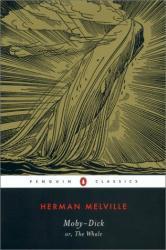
Mobs-Dick, or The Whale by Herman Melville is a novel, in which the narrator, Ishmael, befriends Queequeg, a South Seas harpooner, and together they look for a whaling crew. Eventually, they join Captain Ahab aboard the Pequot.
Ishmael soon finds that Ahab had lost his leg and vessel to a powerful whale, who is called Moby-Dick. The captain and his crew sail around the world to hunt down the whale for revenge. The book does have a very deep and ambitious theme, as Herman Melville addresses many controversies throughout his writing, with subtle remarks. The characters and plot fit perfect together and everything is well developed with some sort of backstory. My only problem with this book is that it includes many useless and boring chapters. They don't add anything to the story, and while they attempt to bring up a deep topic, they completely and utterly fail to. Overall this book is decent and definitely aspires to be the "mighty book" that it's meant to be. I would recommend it to people who like high seas adventure novels.
Grade: 8
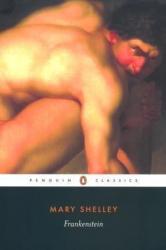
Mary Shelley's Frankenstein is a book about the horrors of creating life. The book succeeds in developing most of the sidecharacters. You learn in depth about all of their pasts, and the story fits together well. The tragic plot line of the book shows how the decisions made by Frankenstein, the creator of the monster, comes back to haunt him. It almost becomes a game of cat and mouse when Frankenstein chases around his creation for revenge when really, the monster is haunting Frankenstein for his own revenge. Most of the book's themes include loneliness and rejection, and are explained well throughout the back stories of the characters. I feel that the book's only weak point is how the characters face their end. While the characters do indeed learn many life lessons, they never really accomplish anything. None of the characters have sentimental deaths, other than Frankenstein; the book just tells the reader that the character you have just grown attached to...well, dies. The book moves on from their deaths, and then the cycle repeats for the rest of the book. Overall, Frankenstein is a really good book, and I'd recommend it to people that like horror or mystery fiction.
Grade: 8
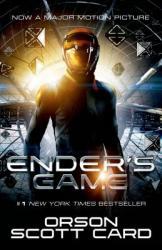
Ender's Game is an enthralling and thrilling sci-fi following a young boy as he is prepped to save the world. Ender departs for battle school at the ripe age of 6, where he is thrust into a world were children go head to head in a competition to be the best, fight in an all out war, and earn all the glory.
Although young and inexperienced, Ender is the best. But things seem to be stacked against him....
Orson Scott Card writes with incredible dexterity and Ender's Game pulls you into a new world.
(Reviewer Grade: 12)
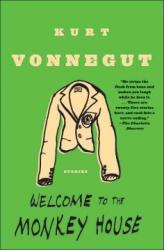
Much like short story anthologies by a single author (see Neil Gaiman’s Smoke and Mirrors and Ray Bradbury’s The Golden Apples of the Sun ), Welcome to the Monkey House is both quintessentially a collection of Kurt Vonnegut’s biting wit and satire as well as an exploration of other genres not often associated with Vonnegut’s style. Fans of Vonnegut will likely have already read some of these short stories (like “EPICAC” and “Tomorrow and Tomorrow and Tomorrow”), but some of the other stories might have been missed and for a good reason.
Overall, Welcome to the Monkey House is a fantastic set of stories, but a few of them fail to have the impact to make them memorable. Granted, these stories are few and far between, and help to break up the well-written social commentaries presented in “Harrison Bergeron” and the titular “Welcome to the Monkey House.” Vonnegut’s ability to show the slippery slope of such ideas as “everyone is equal” and “sex is bad,” respectively, is just as poignant in short form as it is in his novels. The fusion of technology in these stories might seem dated by today’s standards, but they do reveal that Vonnegut was, inherently, a science-fiction writer.
What this collection does well is show that Vonnegut understood the importance of the characters in a story. One of the most entertaining in this collection was “Who Am I This Time?” which contained characters at such extremes of human expression as to be completely unrealistic but somehow relatable and entertaining. Stories like this, which don’t necessarily follow the political or societal commentary that the other stories provide, are nice breathers that give the reader a smile instead of drilling thought-provoking ideas into their skulls. It’s this balance that truly makes Welcome to the Monkey House a must-read.
Vonnegut, true to form as well as outside his element, I give Welcome to the Monkey House 4.0 stars out of 5.
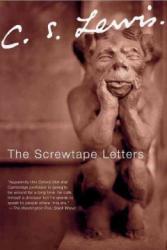
Perhaps the first documented fictional exploration of spiritual warfare, The Screwtape Letters is an expertly crafted examination of what the enemy of our souls is plotting. The reader is given insight into one side of a correspondence between two demons of differing influence and rank, thus providing a “behind the scenes” look at what the enemy is plotting and what they consider to be a victory for them. At moments, it can be difficult to follow along since the context of Screwtape’s “enemy” is really the “good” side of the spiritual battle. Either way, C.S. Lewis has crafted a brilliant satire about how little humans understand of their spiritual lives.
While I wouldn’t necessarily ascribe The Screwtape Letters to pure theology, there are plenty of eye-opening and thought-provoking statements in Screwtape’s letters to his nephew. From the demons’ acknowledgment that pleasure is of God’s design but overindulgence in pleasure is in their realm to the ever-constant battle to bring humanity’s spiritual fervor into the “lukewarm” category, many of the topics covered in this book are still applicable today. In fact, an astute reader can pick up exactly where the demons have gained victories in today’s society filled with apathy and spiritual malaise.
My biggest qualm with this book is that it wasn’t longer. Lewis unquestionably had the creative spark to package theology in an entertaining context via books like this, so I would have liked if there were more letters included in the set to stir up more conversation and induce more moments of reflection in our own lives. If someone were to write the unauthorized sequel to this book that could do so, I would certainly read it in a heartbeat.
The greatest example of writing from an antagonist’s perspective, I give The Screwtape Letters 4.5 stars out of 5.
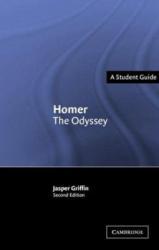
The Odyssey is a very famous book by the ancient author Homer. It is about Telemachus, son of the famous king Odysseus, and his journeys. The literary techniques in this epic, including rhyme scheme, reveal a deeper meaning. I was intrigued by Homer's diction and his use of Greek gods to convey important points. Additionally, the abundance of vivid imagery, intricate metaphors, and extended similes give this epic some zest. The Odyssey is both a fun yet complex read, and I recommend it for everyone.
Reviewer Grade: 11
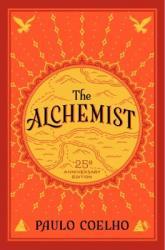
I first picked up this book when I was in maybe 6th grade and I absolutely hated it, I had no clue what it was about and why it was an "adventure" book that didn't really have a lot of action in it. Having picked up this book again this year (and actually finishing it this time) I can honestly say this story made me want to reevaluate how I have lived my entire life. The story follows a boy named Santiago as he searches for his personal legend, in other words, the reason he is alive, his purpose. This is a book that makes you want to go out and chase your dreams no matter what, and it is beautifully written. The novel takes you through the ups and downs of life and proves that sometimes your hard work is worth it in the end, whether you accomplish what you set out to do out not. I think this is a book where the messaged can’t be fully realized until your a little bit older, but to anyone struggling with what they want to do in life or even just where to start, this book is amazing, it made me feel like anything is possible. Just read it, I promise it’s good.
Reviewer: Grade 11
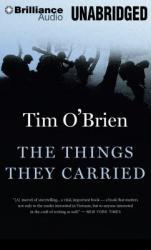
In this book, Tim O’Brien gives a very blunt and realistic view
of the Vietnam War, not only including stories from when he served himself, but also explaining what happens to the soldiers when they finally do get to go home. I honestly would recommend this book to anyone who is willing to read it. While we love and respect our military for saving our country, I think it is very important to also learn about what actual happens out on the battlefield, about the little decisions that can change everything in the heat of battle, and most importantly the guilt that comes with killing your fellow man. My father served in the military for 25 years and to me this book is just so important, it tells stories of war that do not always have a happy ending, or stories that do not necessarily end with the good guys triumphing over all evil.
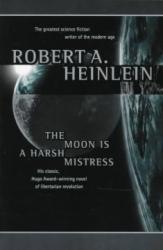
Certainly well ahead of his time, Robert A. Heinlein remains one of the definitive writers of the science fiction genre, even today. In The Moon is a Harsh Mistress, Heinlein covers such topics as artificial intelligence, extraterrestrial colonization, and interplanetary warfare. Even today, most of these subjects are accurately depicted in the narrative, even if some of the technology has advanced past where it was thought to be in 1965. Part of me is almost jealous at Heinlein’s ingenious use of Earth’s gravity well, and I know any attempt I might make to replicate the idea will merely seem derivative in comparison.
As is the case with some of his other works, Heinlein makes many socio-political statements via his writing. His stance on taxes, revolutions, and independent governing bodies is a critical section of the plot in The Moon is a Harsh Mistress, and I can certainly see the theoretical benefits he puts forth in this context. That being said, his views on polygamy and polyamorous relationships are certainly on display again, with his previous work, Stranger in a Strange Land exploring these themes in greater detail. I can only assume the "free love" culture of the 1960's shaped these opinions.
Overall, the book wasn’t quite what I expected. The initial chapters made me hope the plot would center on the relationships between man and artificial intelligence (AI). If anything, AI is shown to be a powerful tool that can influence society in ways we can’t even begin to comprehend. At the very least, the main character was quite entertaining, if not hard to understand at times with his “accent.” If we do eventually colonize the moon, I can hope we do so peacefully and in a way that doesn’t lead to an uprising of its native inhabitants. After all, I do like living in a Colorado Springs devoid of meteoric bombardment.
A well-thought out sci-fi story decades ahead of its time, I give The Moon is a Harsh Mistress 4.0 stars out of 5.
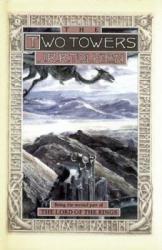
The second installment in J.R.R. Tolkien's "Lord of the Rings" trilogy, "The Two Towers," takes up the challenge of doubling up on the success of Tolkien's previous novel. This is a daunting task, as fans clamored to the brilliant and wonderfully crafted masterpiece of "The Fellowship of the Ring". Though after having read and thoroughly reflected upon Tolkien's most recent work, I am pleased to say that he was able to exceed my expectations.
The novel begins directly where the last left off, with Frodo Baggins having been taken hostage by a group of vicious orcs. In spite of this setback, he is still on a quest to destroy the mystical ring, but as is to be expected in such a story, his journey is neither simple nor straight-forward.
Along the way, Frodo makes encounters with a number of new characters, ever-diversifying this creative and beautifully crafted story. Their journey stands witness to a number of conflicts, wars, and battles, with various different social groups across the realm taking part. Through it all, as Frodo inches closer to his destination, the faded shadow of Mordor- where the Dark Kingdom and Sauron await- gleams in his foresight.
I originally picked up this novel immediately after the last, and am glad to have read it. Some may not enjoy the novel quite as much, due to the fact that the language is very particular and can sometimes present readers with a bit of a learning-curve. However, the story manages to continue to enhance the rich narrative setup in the previous novel, and does a wonderful job with transitioning the story forward. Tolkien’s colorful and imaginative lore’s, histories, and descriptions truly make this novel a must read!
Reviewer’s Grade Level: 10
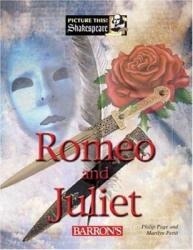
As is likely the case with many readers, I was assigned to study the play "Romeo and Juliet" in a high school English class. While it's true that I was led on to read the book out of obligation, I ended up forming some pretty spirited opinions on the novel. I definitely was not engaged in this read, but even still, am able to respect its excellence in the context of Shakespeare's time.
As a reader, you can tell that the language used is vastly different from that of the common, English vernacular. For this reason, it can sometimes be a challenge to understand what is going on in the plot, especially since the story is told through the lens of a play. Before attempting this read, I would certainly brush up on some basic play terms, to grasp a better understanding of the composition of such a work.
Another factor contributing to the difficulty of this read is Shakespeare’s use of Iambic Pentameter, a rhyming scheme ideal for sonnets where three sets of rhyming quatrains and two lines of rhyming couplets are alternated. I found it truly impressive that Shakespeare manages to devise these rhymes with so much detail and insight. To go through with reading this novel, I would have to suggest to understand the rhyming scene of Iambic Pentameter, as doing so allows you to come to terms with a greater appreciation for Shakespeare’s work.
I found the plot itself to be a bit too inconstant. While at first the novel seems somewhat believable, the ending turns totally wild and unpredictable. I don’t mean to critique Shakespeare’s work, as his play was truly revolutionary for its time, but to a 21st century teen, this novel may not be the most enjoyable.
In terms of the themes, the novel excels with powerful and proactive lessons.
Reflecting on the plot, and Shakespeare’s use of literary devices such as foreshadowing, can lead to meaningful conversations and analyses about life, love, and happiness.
Overall, I would pin my recommendation on this book, but only if you take the time to understand the niche delicacies of Shakespeare’s writing. At face value, the novel may not seem the most exciting or engaging to the reader, but by appreciating the literary masterpiece found in Shakespeare’s work, you’ll definitely enjoy the read!
Reviewer’s Grade Level: 10
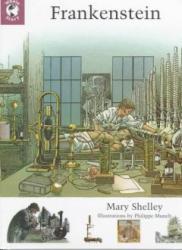
Frankenstein was a disappointment to me. As per the Romantic period, this novel used lots of scenes in nature to explain the characters’ emotional states. I do not mind a few good cries in a storm, but this novel borders on incessant outdoor melodrama. I decided to disregard both the plot and the setting in a vain attempt to enjoy the novel. I would only focus on the characters. As this was written by a female author, I looked forward to the female characters, which were awful. One, Justine, is a servant and seems only to exist in order to die. Elizabeth, who also seems to share this quality, is regarded as an object to be owned in a creepy incestuous manner by her cousin; she is apparently superior and virtuous only because of her noble birth. So, I dismissed the female characters to focus on the males, none of which were believable. Victor, his friend Henry, and his monster all were overly emotional, and they inspired no sympathy from me. With no likable characters and emotions running everywhere, I would only read Frankenstein if required.
Reviewer Grade: 9
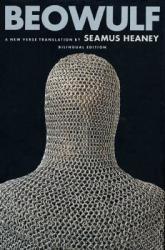
Beowulf is a classic heroic epic written one thousand years ago; I read the version that Seamus Heaney translated into modern English. This translation was excellent, managing to balance the original style and rhythm with a clear and understandable tone. Beowulf is a traditional hero. As a result, some of the plot points are fairly predictable. Nevertheless, I would recommend this epic poem to anyone who enjoys Tolkien or other fantasy series. Reading Beowulf, it is easy to see where more contemporary authors got their inspiration.
Reader Grade: 9
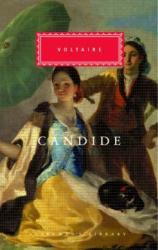
Candide is one of my favorites. Though it does deal with real problems, it is an exceedingly fun read. This is thanks to the sardonic, sharp wit of Voltaire. Satire is executed beautifully in this book. If you pick up this book, chances are you will laugh out loud. I very strongly recommend Candide.
However, if you do read it, please be patient with it. Because Candide was written in 1758, some hilarious and important details can go right over the reader's head. But if you put in some time to understand what Voltaire is really trying to say, it will be worthwhile.
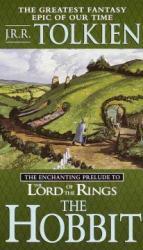
Originally written for his children, J.R.R. Tolkien's fantasy novel “The Hobbit” is hailed among book critics as a remarkable, introductory-level fantasy novel. It manages to engage readers with an epic and timeless plot, while also avoiding the use of profane language and violent scenes.
The tale is set in Middle Earth, home to a number of human-like species including the Hobbits, Dwarves, and Elves. Over the course of the novel, Tolkien provides a rich background of the history of these three species.
Namely, the majority of backstory is setup around the dwarves- who originally inhabited the “Lonely Mountain” and made their fortune off of mining gold. Their empire prospered until at last, a greedy, gold-seeking dragon named “Smog” wreaked havoc to their way of life.
Enter Bilbo Baggings, a middle-aged Hobbit settling down in the Shire. After he hosts a seemingly ordinary dinner party, his life is turned inside out, and the inner spirit of adventure is awakened with him. He joins in a quest to reclaim the dwarf home, and takes part in a number of adventures along the way.
I originally read this book after finishing the “Lord of the Rings” trilogy. While it’s true that this novel is aimed at a younger demographic, it is certainly still an engaging read for older teens and adults. J.R.R. Tolkien embeds a number of rich storytelling devices into his writing, and it makes the read an absolute pleasure!
If you decide not to try this novel, I would suggest reading “A Game of Thrones” by George R.R. Martin. It is certainly not as child-friendly, and has some pretty gruesome scenes, but Martin’s writing makes up for many of the imperfections of Tolkien’s work. Overall, The Hobbit is most aptly suited for readers aged 8-12, and serves as a great introductory novel to fantasy literature. For older readers, I might suggest a different read, but all the same, and in spite of your age demographic, The Hobbit is truly a timeless masterpiece of literature and is worth giving a try!
Reviewer Grade: 10
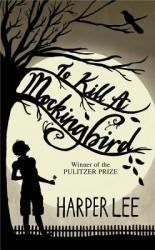
Although it was a little hard for me to get into this book, once I did I was hooked. This book is about Scout, a 7 year old girl who is dealing with the hardship of her father having to defend a black man of rape in the 1940's. Along the way, Scout and her brother Jem meet Dill and they spend their summers together. Dill wants to get Boo Radley to come out of his house, and in the end, he does. With this book is the message to put yourself into others shoes to see how they feel. A classic book, great for anyone.
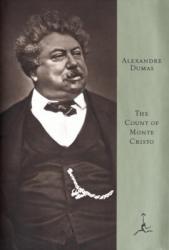
"The Count of Monte Cristo" by Alexandre Dumas is a fantastic whirl-wind of unforgettable characters and interweaving story-lines that left me awestruck and yearning for an even deeper glimpse into this world of treachery, romance, adventure, and mystery. This book is as deceivingly witty as it is over-flowing charisma and has nestled its way to a special place in my heart as one of my favorite novels of all time.
The novel starts out with a scenic over-look of an Italian waterway in Marseilles as it carries along a lofty ship named Pharaon with one passenger in particular who is unlike any other named Edmond Dantès. A dashing young and honest man dawning with potential who has just returned with news that will change the course of his life, and the lives of many others, forever. He is falsely accused of traitorous activity and is sentenced to life on a prison located on an island off the coasts of Marseilles forcing him to leave behind his family, his friends, and the love of his life Mercédès. This marvelous tale unfolds within the walls of this prison and among its outer-walls as Dantès attempts to make a dashing escape with a kind mannered preacher. But, this is only the beginning of his tale. As the life of Dantès unfolds, so does the life of the many others who have been lucky enough to fall into his life.
This novel is truly unforgettable as it follows not only the life of Edmond Dantès, but also the lives of his lover, best friend, family, and even his partners from his shipping company. Filled to the brim with treacherous plots, revenge, heartache, mystery, and pirating; it also contains young love, faith that knows no bounds, and families filled with the knowledge that blood truly is thicker than water.
I would recommend this book to anyone looking to fall in love with not only a menagerie of unforgettable characters, but to a reader who is looking to fall head-first into a world that they will find themselves cherishing forever.
Many blessings and happy reading : ),
Reviewer Grade Level 11.
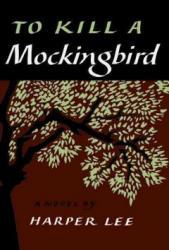
The novel “To Kill a Mockingbird,” by Harper Lee may strike your perception as a seemingly uninteresting story. The book tells the tale of two young children in a sleepy Alabama town, and at face-value, the plot does not garner much intrigue. However, I was in the same situation when I was required to read this book in the spring of my freshman year at high school.
Indeed, while at first the story seemed boring, as I continued to carry on with reading, every turn of the page immersed me ever further into Lee’s timeless story.
As a reader, you share the emotions felt by Jem and Scout, two young siblings, as they learn the nuances of life in the prejudiced American South during the early 1900s. Not only was their community weakened by the economic collapse of the Great Depression, but also sickened by the bitter contempt felt among whites and blacks.
In the beginning of the novel, Jean Louise “Scout” Finch and her brother Jem innocently play games with their friend “Dill” and enjoy life in Maycomb with their father, Atticus. During this time, they have little to no apprehension of the racial tension hanging in their society, but when their father, Atticus Finch, who works as lawyer, openly chooses to defend an African American in court, trouble arises.
Jem and Scout undergo a number of personal developments during the course of the novel. While at first, they carry with them a genuine and child-like innocence, the court trial their father has taken on exposes them to the racist indignity felt by their fellow community members. Jem and Scout struggle to balance their conflict between the social norms of Maycomb and the morals their father has instilled in them. With the trial’s end, Jem and Scout are lead to discover the imperfections of their society, and the ways with which they are forced to deal with them. As the reader follows along, they not only watch Jem and Scout change, but they too themselves are shaped through Lee’s captivating story.
Overall, I enjoyed most aspects of the book. Although some scenes I felt were a bit plain and unprogressive, these minor flaws were overshadowed by the powerful themes Lee expresses through the story. If you haven’t already read To Kill a Mockingbird, I would certainly give the novel a try. If not for the genuine enjoyment of reading the story, try this novel to feel the powerful emotions stirred from Lee’s literary masterpiece.
Reviewer Grade: 10
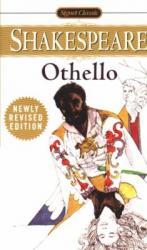
Shakespeare's Othello is about a Moorish general for the Venetian army, Othello, who falls in love with a Venetian lady, Desdemona. Unfortunately, Desdemona's father is very racist and sees Othello as vermin when he finds out they're in love. Being Shakespeare, this book is very tragic.
Though this play may have been well-written, I don't have much else good to say. The plot is extremely simplified, and the characters are infuriatingly stupid. This book is not a boring read, but it is also in no way interesting.
The characters are not very developed, relatable, or lovable. This dramatically stunts this play's ability to be tragic. Needless to say, I am not a huge fan of this book, but there were some good things about it.
Reviewer Grade: 11
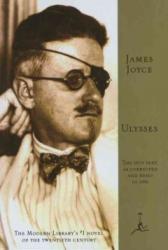
OK, I’ll be the first to admit that perhaps the audiobook version of this
story isn’t the best way to digest it. While I did appreciate the Irish
accent of the man who read this book, there really wasn’t much of a chance
to re-read sections that were quite confusing. As a result, I have no idea
what this book is about or what it was supposed to convey. I had a loose
understanding that it was based on Homer’s The Odyssey, which helped make a
few connections here and there, but I honestly can’t say that this parallel
between the plots of the two stories is obvious at all.
Perhaps the weakness I perceive in this story is due to its status as one of
the great pieces of modernist literature. If that’s the case, then I’ll
admit that I don’t understand modernist literature at all. None of it made
any sense at all. I would almost wager, at times, that Joyce was merely paid
by the word, thus explaining the numerous times he just listed off the names
of people, synonyms of words, or just rambled on until he made a couple extra
shillings. Of course, it could be that I expected a story to be present
instead of a loose string of poetic and complicated words. Maybe that’s the
link it shares with The Odyssey: both are epic poems (but for my money, I’d
read The Odyssey again in a heartbeat instead of this).
This is also not to mention the controversial topics that Joyce covers in
this book. From sex to religion and back to sex again, I wouldn’t say I
agree with his opinions on anything. For years I’ve heard that this is one
of the great stories of literature, but I can’t say I’m impressed. None
of it was particularly inspiring (the parts that made any sense, that is) and
if he had a point to make, it was lost on me. Again, I might get more out of
Ulysses if I was able to read it instead of listening to it, but as it stands
I don’t have any interest in reading this lengthy piece of nothingness
after having had to listen to it.
A disappointing and confusing piece of “literature”, I give Ulysses 1.0
stars out of 5



 Ruth Holley Library will be temporarily closed for approximately one week starting Mon., Dec. 2 to complete roof repairs.
Ruth Holley Library will be temporarily closed for approximately one week starting Mon., Dec. 2 to complete roof repairs.